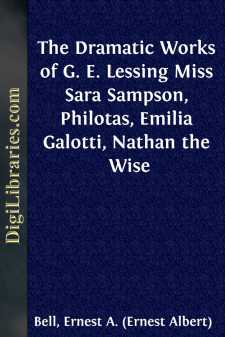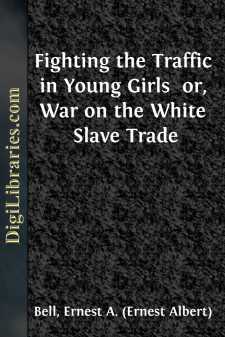Categories
- Antiques & Collectibles 13
- Architecture 36
- Art 48
- Bibles 22
- Biography & Autobiography 813
- Body, Mind & Spirit 141
- Business & Economics 28
- Children's Books 12
- Children's Fiction 9
- Computers 4
- Cooking 94
- Crafts & Hobbies 4
- Drama 346
- Education 46
- Family & Relationships 57
- Fiction 11826
- Games 19
- Gardening 17
- Health & Fitness 34
- History 1377
- House & Home 1
- Humor 147
- Juvenile Fiction 1873
- Juvenile Nonfiction 202
- Language Arts & Disciplines 88
- Law 16
- Literary Collections 686
- Literary Criticism 179
- Mathematics 13
- Medical 41
- Music 40
- Nature 179
- Non-Classifiable 1768
- Performing Arts 7
- Periodicals 1453
- Philosophy 64
- Photography 2
- Poetry 896
- Political Science 203
- Psychology 42
- Reference 154
- Religion 513
- Science 126
- Self-Help 83
- Social Science 81
- Sports & Recreation 34
- Study Aids 3
- Technology & Engineering 59
- Transportation 23
- Travel 463
- True Crime 29
The Dramatic Works of G. E. Lessing Miss Sara Sampson, Philotas, Emilia Galotti, Nathan the Wise
Description:
Excerpt
Since Luther, Germany has produced no greater or better man than Gotthold Ephraim Lessing; these two are Germany's pride and joy.
This is the witness of Heine, and with Goethe in memory, none would pronounce the statement too bold. Luther and Lessing are Germany's representative men; each inaugurates an epoch the very existence of which would not have been possible without him. Nor is this the only point of analogy. Lessing was the Luther of the eighteenth century. Like Luther, Lessing is distinguished by earnestness, ardour, true manliness, fierce hatred of dissimulation, largeness of mind, breadth, and profundity of thought. Like Luther, he stands in history a massive presence whereon the weak may lean. Like Luther, he led the vanguard of reform in every department of human learning into which he penetrated. Like Luther, he was true to every conviction, and did not shrink from its expression. Like Luther, he could have said, "I was born to fight with devils and storms, and hence it is that my writings are so boisterous and stormy." Like Luther, he became the founder of a new religion and of a new German literature. And again, like Luther, his life labours were not for Germany alone, but spread over all Europe; and few of us know how much of our present culture we owe directly or indirectly to Lessing's influence.
In this country he has not been sufficiently known. Up to the present, his name has been familiar to Englishmen only as the author of the 'Laokoon,' 'Nathan the Wise,' and, possibly also, of 'Minna von Barnhelm.' In knowing these, we certainly know the names of some of his masterpieces, but we cannot thence deduce the entire cause of the man's far-spreading influence.
Fully to understand Lessing's influence, and fully to understand the bearing of his works, some slight previous acquaintance with German literature is absolutely requisite. For unless we comprehend the source whence an author's inspirations have sprung, we may often misconceive his views. And Lessing's writings, above all, essentially sprang from the needs of his time. The subject is a large one, and can only be briefly indicated here; but we venture to remark, for those whose interest may be aroused in the subject of this volume, that the fuller their knowledge of the man and the motive force that evoked his works, the keener will be their enjoyment of these works themselves.
In naming Lessing, Goethe, and Schiller, we utter the three greatest names that German literature can boast. And between the three runs a connecting link of endeavour; the efforts of none can be conceived without the efforts of the others; but Lessing was the leader. He was the mental pathfinder who smoothed the way for Goethe's genius, and prepared the popular understanding for Schiller, the poetical interpreter of Kant.
Lessing was born in the early years of the eighteenth century, at a time therefore when Germany may be said practically to have had no literature. For the revival of learning, the interest in letters that arose with the Reformation, and had been fostered by the emancipating spirit of Protestantism, had been blighted and extinguished by the terrible wars that ravaged the country for thirty years, impoverishing the people, destroying the homesteads and farms, and utterly annihilating the mental repose needful to the growth and to the just appreciation of literature....




